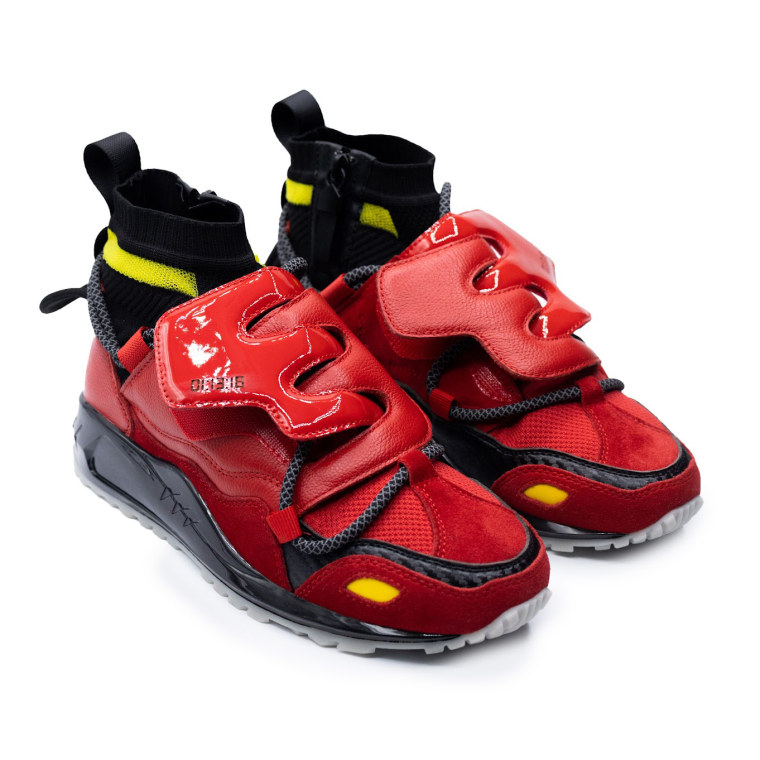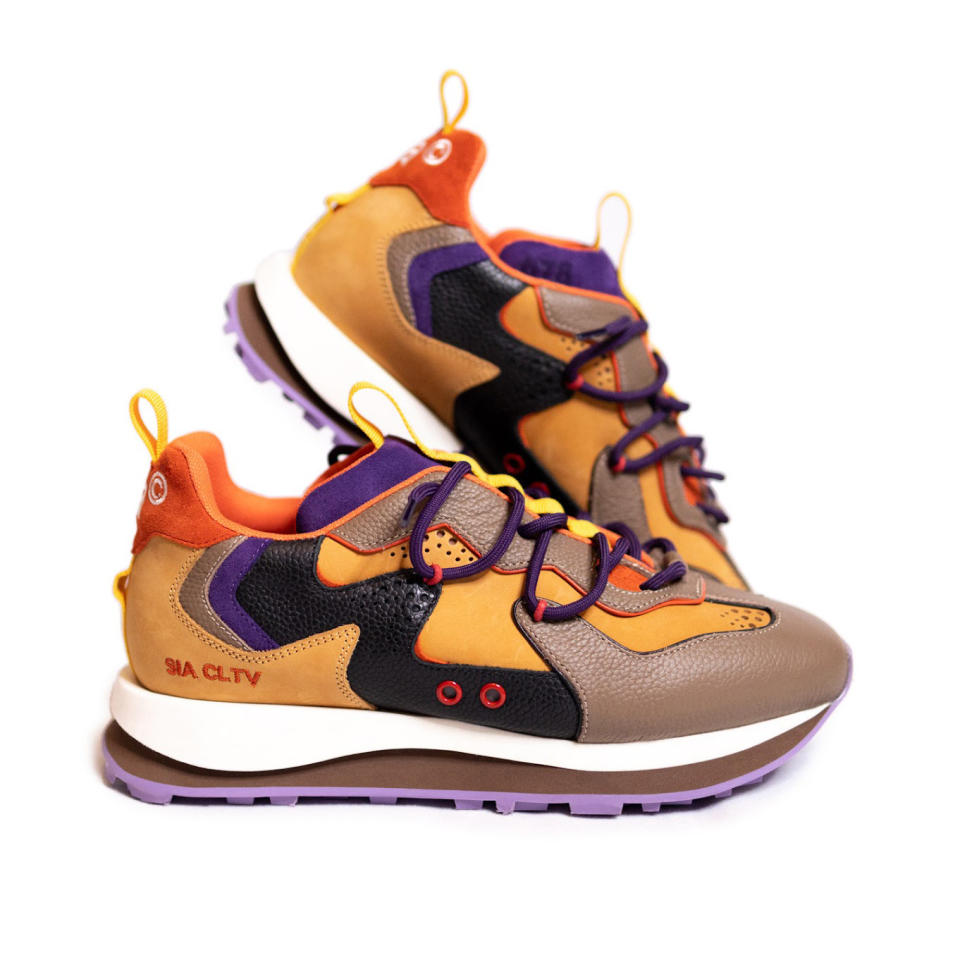Twenty years ago, Devlin Carter was in the Coast Guard, serving his country on the waters around the United States. All the while, however, his passion for fashion — sneakers in particular — traveled with him.
When he was stationed in his hometown of New York in 2011, Carter scrolled through Instagram one day and realized that social media was an efficient, inexpensive way to get his unique talent for transforming an existing shoe into a fashion statement in front of countless eyeballs.
That revelation led Carter on a creative endeavor that by 2019 evolved into SIA Collective, which is now a multimillion-dollar brand that produces trendy shoes with futuristic designs and contrasting colors that are distinct from mainstream options.
“It’s been a journey,” Carter said.
Each pair often becomes a conversation piece among sneaker heads and casual shoe buyers alike, which is no small feat in a $70 billion industry dominated by behemoth brands that had largely shut out Black retailers and Black-owned sneaker makers.
Carter and SIA Collective caught the eye of both sneaker collectors and NBA fans when basketball star Kyrie Irving — who had his sneaker endorsement agreement revoked by Nike in December after he posted a link on social media to a controversial book and film that were laced with antisemitic tropes — acknowledged to NBC News earlier this year that he is considering a partnership with Carter’s brand.
A potential deal between Irving and a Black-owned company like SIA Collective could shift the standard of “how young Black athletes look at endorsement deals moving forward,” Carter said. “It would show they don’t have to be locked into a deal and not feel like they are property. They can take ownership of their off-the-court game.”
The Dallas Mavericks’ Irving, who also was embroiled in controversy in 2021 because he refused to take the Covid vaccinations, lauded the team behind SIA Collective. “I’m looking for a home where we can build up a huge marketplace and that I can have some ownership,” he said to NBC News. “I’m definitely not going to go back into a similar contract that I was in or any type of circumstance that I was in similar to what I was with that other brand.”
Earl West, a self-described “sneaker head” who has more than 900 pairs of athletic shoes, said that until recently he was unaware of SIA Collective. “This is a hot industry and to learn about this brand, Black-owned, creating these creative, high-quality shoes is amazing. The support for it will only grow.”
Carter grew up around fashion
Carter’s mother was a seamstress, and so he’s had a connection to clothes and fashion for as long as he can remember. But because he thought sewing was not a masculine endeavor, he did not learn how to use a sewing machine until much later in life.
Rather, he picked a mentor — Augusto Cerrone, who owns American Shoe Repair in Queens, New York. “Augie,” as Carter calls him, came to America from Italy when he was a kid and learned the shoe repair trade. He much later mentored Carter allowing him to observe and use his machines to create innovative designs.
“I learned a lot from him,” Carter said. “He gave me access, taught me. It was what I needed.”
“He reminded me of me,” Cerrone, 71, said. “He came to me when he was in high school and said, ‘Can I do things like this, modifying sneakers?’ I said to him, ‘I cannot do the work for you. But if you want to come and hang around the shop and watch and learn and ask questions, I’m here for you.’”
For two years while at Richmond Hill High School, Carter did just that. And, in the process, they built a bond. “He’s like a son. He’s very respectful and talented. A nice fellow. He wanted this for himself,” Cerrone said. “What I really saw in him was a lot of patience.”
Cerrone became emotional when talking about how Carter surprised him at the hospital after he had heart surgery in 2019. “Just a fine young man,” Cerrone said. “And he’s earned everything he’s gotten.”
As he grew under Cerrone’s tutelage, Carter showed off what he learned and exercised his creative urges by going to New York’s Canal Street in lower Manhattan, where he would buy fake Gucci items. He would then deconstruct a pair of Jordans and reconstruct them with fabrics and logos. Athletes and rappers — and everyday sneaker buffs — loved them.
After languishing professionally but still creating for a couple of years, Carter became inspired to join the Coast Guard. When a stranger walking next to him on a New York City street was shot, he felt he needed to leave the city. A career in the Coast Guard, he felt, aligned with his father’s career as a New York City police officer. And although he knew continuing to make custom sneakers would be a challenge, he eagerly reported to boot camp in Cape May, New Jersey.
The trajectory of his life and career began to change when he was stationed in New York in 2011. Carter gained traction on social media as he worked daily at producing new shoe concepts — even after 12-hour shifts with the Coast Guard.
“The way to stand out was to produce more than anyone else,” he said about competing with other independent brands seeking to break through. “So, when my competition was doing one shoe a month or every week, I was creating new shoes every day, sewing materials on shoes, something no one else was doing.”
In 2014, he was stationed in California, and brought his young children with him. By then, he was committed to making his way in the shoe game. “I just felt like there was no way I should keep wearing that uniform knowing I had a talent to do big things,” he said. “And I knew I couldn’t tell my young daughters one day to chase their dreams if I didn’t do so myself.”
So he left the Coast Guard. Two months later, he enrolled in the Fashion Institute for Design and Merchandising in San Francisco. That knowledge helped him up his skills and grow his audience.
Carter’s talent was noticed in the industry and the brand Under Armour offered him a sneaker designer job after he recreated the Curry 6 shoe made for Golden State Warriors’ star Stephen Curry. He was uncertain about his ability to make shoes from scratch. And the job required that he live in Oregon, which did not coincide with his promise to his two daughters that he would never leave them again after quitting the Coast Guard.
True to his word, he took a job as a consultant and was content running a retail store he had opened in Oakland and doing community service work, including teaching inner-city youths how to sew.
Then he received an email from a fellow Fashion Institute for Design and Merchandising graduate, who was Black, lived in China and worked in mass production. He offered his assistance. “I didn’t even think that was a feasible thing for a Black man to do at the time,” Carter said. “But it gave me no excuse on why not to start my own thing.”
SIA Collective was born. He launched by selling just one style of shoe in 2019. Carter worked tirelessly, often well into the night, studied business and also trusted his instincts. Now, his sneakers and casual shoes — for men, women and kids — are sensations in urban communities and the suburbs alike.

He built his company to have eight full-time employees at its California office and a fulfillment center in Colorado with nine workers. It also operates a clothing factory in Pakistan with 21 employees.
“No one works for under $80,000 a year,” he said. “I am employing my people, and there’s great reward in that.”
Carter’s company brings in at least $25 million in sales annually just through social media and word of mouth; he has spent no money on advertising, he said. His sneakers can sell for around $220 a pair.
“We have a very large and mixed demographic that spreads the word,” he said. “I’m a storyteller and I tell stories in my shoe designs.”
Carter’s story seems far from complete. “It has been a remarkable journey,” Carter said. “The good news is that there is more to come.”


